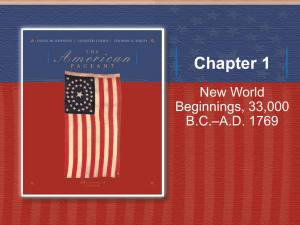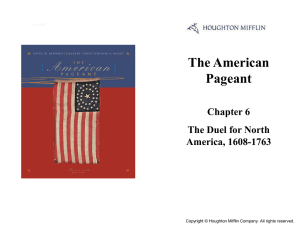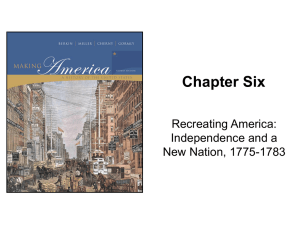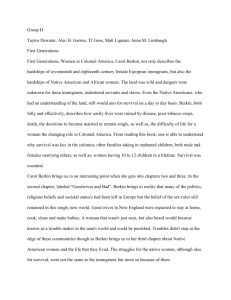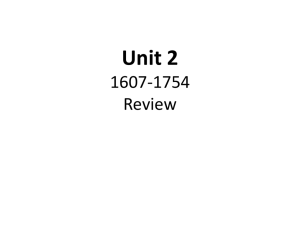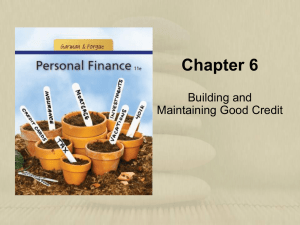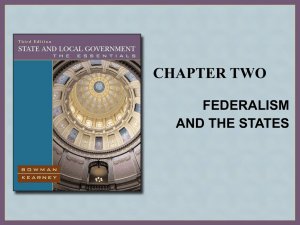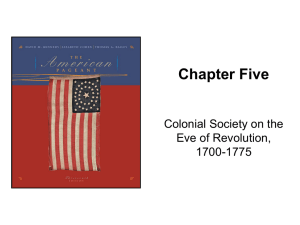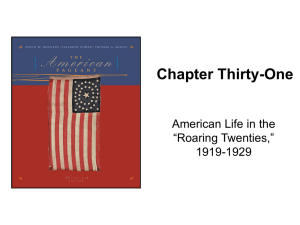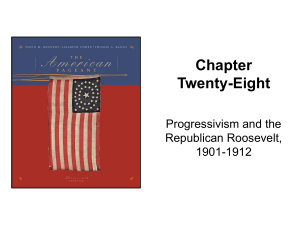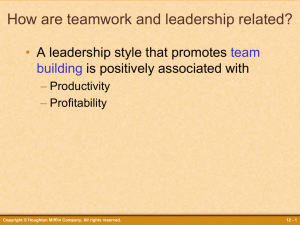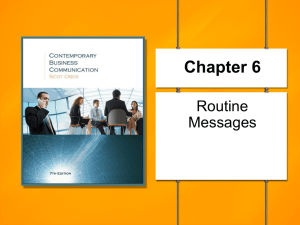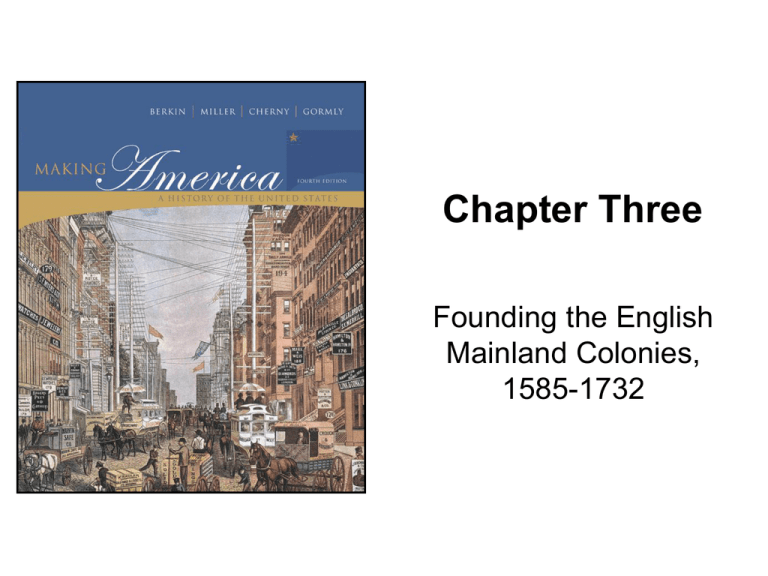
Chapter Three
Founding the English
Mainland Colonies,
1585-1732
Berkin, Making America
Chapter 3
Following the disappearance of
Roanoke, English efforts to establish
colonies relied upon
1. members of the nobility.
2. massive government programs.
3. cooperative ventures with the Netherlands and
other Protestant powers.
4. investment by merchants in joint-stock
companies.
Copyright © Houghton Mifflin Company. All rights reserved.
3-2
Berkin, Making America
Chapter 3
Following the disappearance of
Roanoke, English efforts to establish
colonies relied upon
4. investment by merchants in joint-stock
companies.
Hint: The crown decided to rely on the wealth of
private entrepreneurs, who were able to minimize
their risks through the device of the joint-stock
company. See page 63.
Copyright © Houghton Mifflin Company. All rights reserved.
3-3
Berkin, Making America
Chapter 3
The settlement at Jamestown at first
ran into severe difficulty because
1. some of the settlers were gentlemen who did not
know how to work.
2. the Indians immediately attacked them.
3. imports of African slaves bankrupted the settlers.
4. hurricanes destroyed Jamestown.
Copyright © Houghton Mifflin Company. All rights reserved.
3-4
Berkin, Making America
Chapter 3
The settlement at Jamestown at first
ran into severe difficulty because
1. some of the settlers were gentlemen who did not
know how to work.
Hint: Many were “gentlemen adventurers” who
refused to perform manual labor. See pages 64–
66.
Copyright © Houghton Mifflin Company. All rights reserved.
3-5
Berkin, Making America
Chapter 3
Most colonists in Virginia eventually
moved away from Jamestown
because
1. it was unsafe because of the local Indians.
2. Captain John Smith's military form of government
was brutal.
3. tobacco became the colony's economic mainstay.
4. it was too expensive to live there.
Copyright © Houghton Mifflin Company. All rights reserved.
3-6
Berkin, Making America
Chapter 3
Most colonists in Virginia eventually
moved away from Jamestown
because
3. tobacco became the colony's economic mainstay.
Hint: Tobacco required extensive tracts of land,
causing the colonists to expand over a large
region. See pages 64–66.
Copyright © Houghton Mifflin Company. All rights reserved.
3-7
Berkin, Making America
Chapter 3
One of the most effective ways of
attracting English settlers to Virginia
in the first half of the seventeenth
century was
1. employing free labor at relatively high wages.
2. offering fifty acres of free land per person to those
who paid their own passage fares from England.
3. promising great wealth from mining gold and
silver.
4. assuring religious dissenters that they would be
protected from persecution.
Copyright © Houghton Mifflin Company. All rights reserved.
3-8
Berkin, Making America
Chapter 3
One of the most effective ways of
attracting English settlers to Virginia
in the first half of the seventeenth
century was
2. offering fifty acres of free land per person to those
who paid their own passage fares from England.
Hint: The Company awarded fifty acres for every
person who was transported at private expense
from England to Virginia. See pages 65–66.
Copyright © Houghton Mifflin Company. All rights reserved.
3-9
Berkin, Making America
Chapter 3
Coode’s Rebellion in Maryland in the
1680s is a good example of colonial
conflicts between
1. Indians and colonists.
2. Protestants and Catholics.
3. slaves and masters.
4. England and France.
Copyright © Houghton Mifflin Company. All rights reserved.
3-10
Berkin, Making America
Chapter 3
Coode’s Rebellion in Maryland in the
1680s is a good example of colonial
conflicts between
2. Protestants and Catholics.
Hint: See pages 67–68.
Copyright © Houghton Mifflin Company. All rights reserved.
3-11
Berkin, Making America
Chapter 3
Plymouth's Mayflower Compact was
similar to Virginia's House of
Burgesses in that
1. both required church membership in order to vote.
2. the king established them.
3. both gave colonists an opportunity to participate in
government.
4. both were abolished under the Dominion of New
England.
Copyright © Houghton Mifflin Company. All rights reserved.
3-12
Berkin, Making America
Chapter 3
Plymouth's Mayflower Compact was
similar to Virginia's House of
Burgesses in that
3. both gave colonists an opportunity to participate in
government.
Hint: The House of Burgesses was a legislative
body, and the Mayflower Compact guaranteed
political participation to all adult males. See
pages 65 and 69.
Copyright © Houghton Mifflin Company. All rights reserved.
3-13
Berkin, Making America
Chapter 3
Maryland was similar to Virginia
because it
1. was established for religious reasons.
2. relied on tobacco as the basis of its economy.
3. sent an expedition to attempt to capture Florida
from the Spanish.
4. None of these
Copyright © Houghton Mifflin Company. All rights reserved.
3-14
Berkin, Making America
Chapter 3
Maryland was similar to Virginia
because it
2. relied on tobacco as the basis of its economy.
Hint: See pages 67–68.
Copyright © Houghton Mifflin Company. All rights reserved.
3-15
Berkin, Making America
Chapter 3
Charles I and James II were alike in
that
1. they relied on the Dominion of New England to
carry out their policies.
2. their religious and political policies led to
successful rebellions against them.
3. both had little interest in English colonization.
4. they wanted to abolish the Church of England.
Copyright © Houghton Mifflin Company. All rights reserved.
3-16
Berkin, Making America
Chapter 3
Charles I and James II were alike in
that
2. their religious and political policies led to
successful rebellions against them.
Hint: Charles I provoked the Puritans to rebel
successfully against him by persecuting them for
their religious beliefs. James II was overthrown in
the Glorious Revolution of 1688 partly because of
his political interference. See pages 62 and 76–
79.
Copyright © Houghton Mifflin Company. All rights reserved.
3-17
Berkin, Making America
Chapter 3
The Glorious Revolution
1. had no effect whatsoever in North America.
2. led to the creation of new colonies south of
Virginia.
3. caused American Indians all along the frontier to
attack the colonists.
4. stimulated a rebellion in Massachusetts.
Copyright © Houghton Mifflin Company. All rights reserved.
3-18
Berkin, Making America
Chapter 3
The Glorious Revolution
4. stimulated a rebellion in Massachusetts.
Hint: For the rebellion in New York and in
Massachusetts, see pages 67–68 and 78–79.
Copyright © Houghton Mifflin Company. All rights reserved.
3-19
Berkin, Making America
Chapter 3
Bacon's Rebellion is best described
as
1. an unsuccessful attempt to challenge the Church
of England.
2. a rebellion by frontier interests.
3. a boundary dispute between Virginia and
Maryland.
4. an uprising of American Indians against white
settlers.
Copyright © Houghton Mifflin Company. All rights reserved.
3-20
Berkin, Making America
Chapter 3
Bacon's Rebellion is best described
as
2. a rebellion by frontier interests.
Hint: Planters on the frontier objected to unequal
taxation imposed on frontier settlers and to a lack
of government military support when conflict with
the Indians erupted in 1676. See page 68.
Copyright © Houghton Mifflin Company. All rights reserved.
3-21

